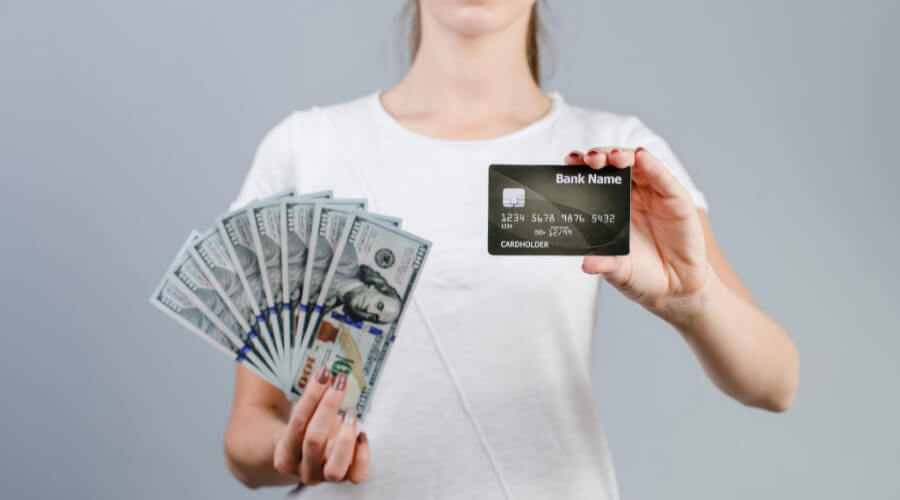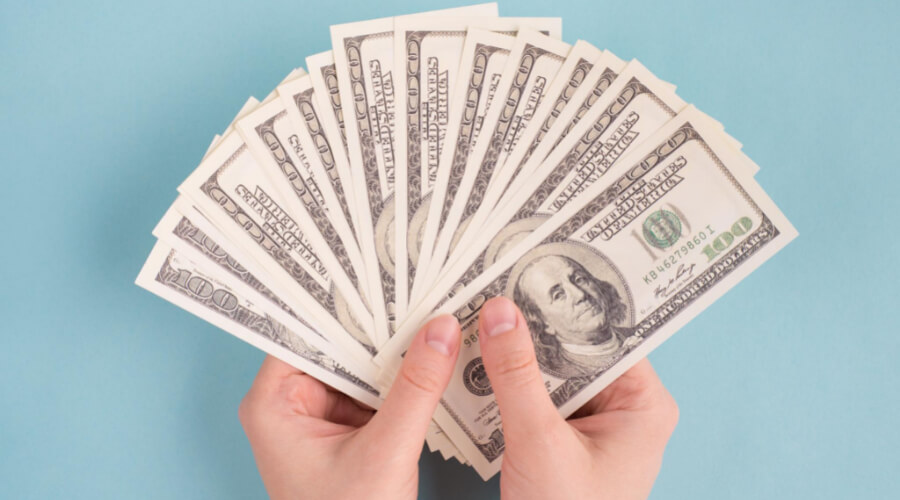Yes, it is completely ok to store 100k to 200k in a checking or savings bank account. However, while keeping this amount of money you should pick a bank account that gives you a higher interest rate. If you don’t need to use the money for at least 6 months to 1 year then you can invest in CDs with staggered maturity dates of three months, six months, 1 year, etc.
Key Takeaways
- Checking and savings bank accounts are two common types of accounts where people can keep their money
- A checking account is best for paying bills, receiving a paycheck, etc. while a savings account is best for storing cash for emergencies
- The amount of money you should keep in your checking account totally depends on how you budget your earnings
- A savings account is specially designed to hold money for a short-term goal like planning a vacation, buying a home, etc.
- According to Federal Reserve data, 98% of American households had at least one transaction account in 2021
What’s A Good Amount To Keep In A Checking Account?

Checking an account is best for paying bills because it allows the account holder to pay bills electronically or by writing checks. Moreover, if you can link a debit card with your checking account then you will be able to make purchases online or in person. You can also link the checking account with the savings account and easily transfer the funds. However, how much money you should keep in your checking account depends on quite a few things including –
1. What is your monthly income?
2. How do you budget your monthly income?
3. Is your checking account allowing you to earn interest on balances?
4. What is your checking account fees?
The amount of money you should keep on your checking account totally depends on how you budget your earnings. For example, if your budget is according to your paycheck and is paid biweekly then you have to keep at least half a month’s worth of expenses in your checking account to cover all your bills until the next payday. If you need more money then you might increase the amount to a full month’s worth of expenses.
Next, you should consider whether the bank offers an incentive like a higher interest rate to keep more money in the checking account. Though, the interest rate you will get will be less compared to a savings or money market account. Moreover, if you want to avoid various banking fees then you can consider keeping more money on the checking account. For example, most banks will charge you a monthly maintenance fee for checking accounts but you might be able to avoid the fees by maintaining a high balance in the checking account.
What’s A Good Amount To Keep In A Savings Account?
A savings account is specially designed to hold money that you don’t want to spend in the near future. Moreover, you can use the savings account or money market account to store away your emergency fund until you need it. If you are opening a savings account for a short-term goal like planning a vacation, buying a home, etc. then you should keep the amount of money that is required to achieve your goal. For example, if you need to save $5,000 for a trip, $8,000 for a car, and $20,000 for a new house then your savings account should have at least $40,000. But it’s not required for you to have a fixed amount for emergency funds. However, according to many personal finance experts, you should have at least six months’ worth of expenses in emergency savings. So, if your monthly expenses are $3,000 then you’d want to have between $9,000 and $18,000 in your savings or money-making account. On the other hand, if your expenses or income fluctuates month to month then you should consider the average of your monthly spending and keep it in the savings account.
How Much Cash Does The Average Bank Account Have?

If you are wondering how much money you should keep in your savings or checking account then you can check how other people are keeping their money. According to Federal Reserve data, 98% of American households had at least one transaction account in 2021. Usually, the transaction accounts include –
1. Checking accounts
2. Savings accounts
3. Money market accounts
4. Call deposit accounts, for investment funds
5. Prepaid debit cards
The high value of the above bank accounts was $41,000 in 2021 and the maiden value was $5,300. So, if you take out the high and low value of this statistic then the typical amount people are keeping in these accounts is $5,000 in cash. Now, it is totally up to you, how much you want to keep in your savings or checking account.
How Much Cash Can You Keep In The Bank?
The banks and credit unions can impose limits on the amount of money you can keep in a particular bank account. Financial institutes can impose these limits per account or as an aggregate across all your accounts. For instant, you might be capped at a $1 million limit for a savings account and a $3 million limit for all your accounts in the bank. Depending on the bank, the limit can be higher or lower. Apart from the bank limits, you should also be aware of other limits like the limits imposed by the Federal Deposit Insurance Corporation (FDIC).
The FDIC provides insurance for various banking account but not every bank account type is covered. For example, FDIC insures –
1. Checking accounts
2. Savings accounts
3. Money market accounts
4. Prepaid debit cards (when certain requirements are met)
5. Certificate of deposit accounts
Usually, the standard insurance amount provided for FDIC-insured accounts is $250,000 per depositor and per insured bank. So, if you have a checking, savings, and a money market account at the same bank then the FDIC insurance will cover a total of $250,000 for a combined balance of your all three bank accounts. Anything above this amount won’t be insured by the FDIC. So, if you keep more than $250,000 in cash at a single bank account then you will have the potential risk of having some of those funds be unprotected if your bank fails. Therefore, if you have more than $250,000 in cash then you could open multiple accounts at different banks to separately store the money and also below the $250,000 limit.
FAQs About Is It Okay To Store 100k To 200k In Checking Or Savings Bank Account?
What Are The Best Places To Store Additional Amounts Of Cash?
If you have additional cash then you can keep them stored in these places –
1. Money market and CD accounts
2. Retirement or education accounts
3. Investments
Is It Smart To Keep Money In Different Banks?
If your cash amount is above $250,000, then it is better to keep money in different banks to achieve the $250,000 limit of FDIC insurance. But if your balance is below $250,000, then you can keep all your money in the same bank account.
Is It Safe To Keep A Large Amount In A Savings Account?
The answer to this question depends on you. If you are happy with the interest rate of your saving account and not comfortable with investment then you can keep all your money in the savings account. However, if you want to earn more money then you should invest the money instead of keeping them in the savings account.
References:
1. https://flowingdata.com/2019/10/29/when-people-reach-100k-in-savings/
2. https://financiallyhappy.ltd/is-100k-in-savings-a-lot/
3. https://www.forbes.com/advisor/banking/how-much-cash-should-you-keep-in-the-bank/
Last Updated on November 6, 2022 by Magalie D.

Magalie D. is a Diploma holder in Public Administration & Management from McGill University of Canada. She shares management tips here in MGTBlog when she has nothing to do and gets some free time after working in a multinational company at Toronto.





